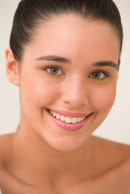Iodine | Pimples | Non-Comedogenic | P-Acnes | Blackheads | Whiteheads | Popping Pimples

Rosacea, aka "Adult Acne"
Rosacea is a disease of the skin that causes redness, red lines and pimples on the face. Rashes frequently form on the face, as well. Both men and women aged 30-60 are most likely to suffer from rosacea -- women suffer more frequently, but men have more severe symptoms.
Rosacea is sometimes called "adult acne" because it can cause the formation of pimples and pimple-like outbreaks.
Skin care products can exacerbate the symptoms of rosacea, causing flare-ups. If untreated, rosacea can become increasingly severe, even disfiguring.
Rosacea isn't really related the same as adult acne. The only reason this website discusses rosacea is that it is frequently mistaken for acne.
What causes rosacea?
Scientists aren't exactly sure what causes rosacea. There are two major theories to explain rosacea.
One leading theory is that people suffering from rosacea have blood vessels more easily irritated than most people. A variety of triggers including exercise, stress, hot weather, spicy foods, alcoholic beverages and/or most skin care products can inflame the blood vessels, leading to the redness and rashes of rosacea.


How is rosacea related to acne?
The heat generated by rosacea can create an ideal breeding ground for P. acnes in the pores of the skin. Blocked or clogged pores can lead to the comedones associated with acne.
Rosacea can also cause red pimple-like bumps that appear along with redness on the face. These bumps look like pimples but they aren't the same as comedones (they have no whiteheads or blackheads associated with them).
How to get rid of rosacea
There is no cure for rosacea. Treatments focus on relieving the symptoms associated with the particular type of rosacea you have. Avoidance of your particular triggers is key -- so keeping a list of rosacea outbreaks can help you determine what your triggers are.
If you suspect you have rosacea, you should visit a dermatologist for a diagnosis.
Recommended acne treatments
Learn which product is considered to be the very best acne treatment!



